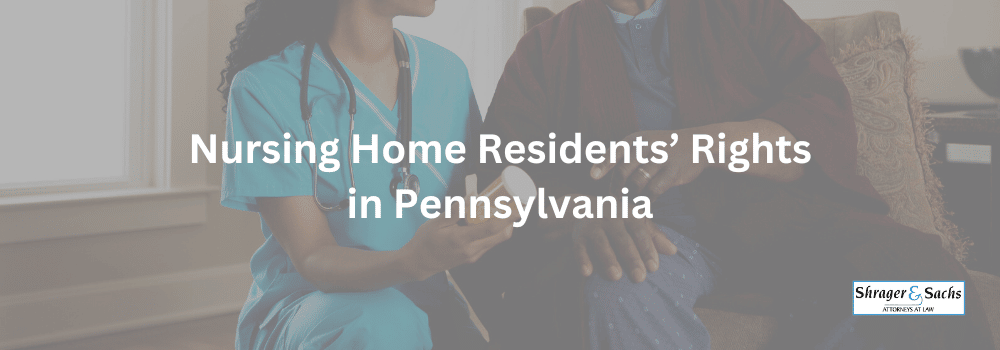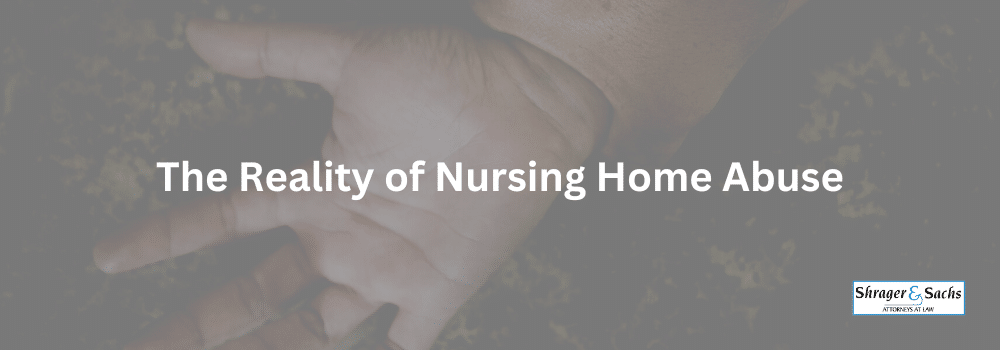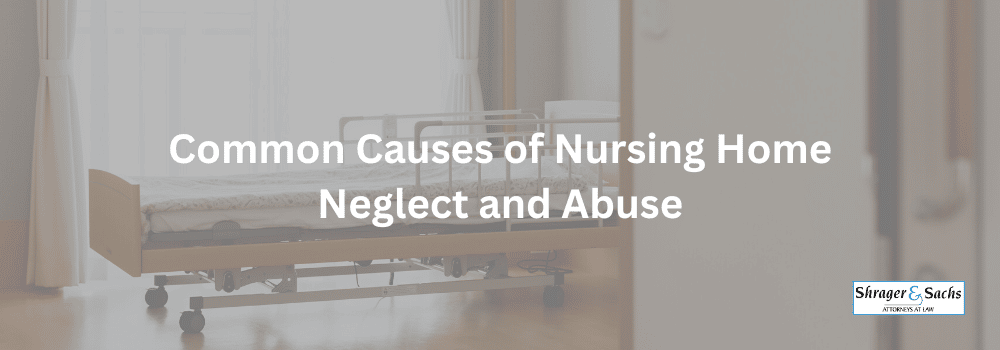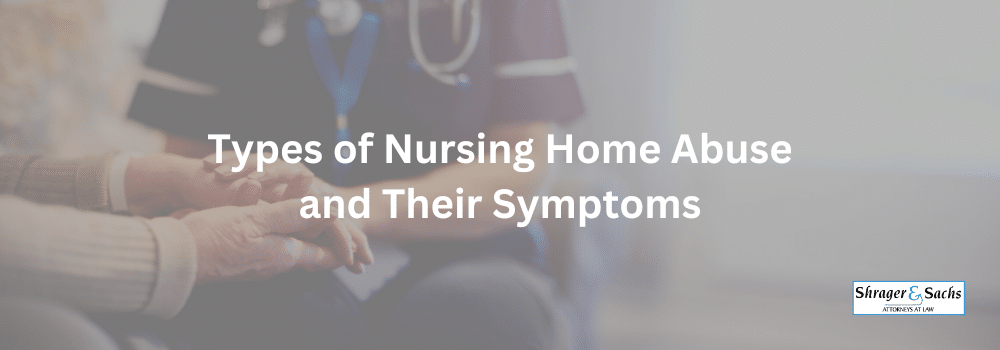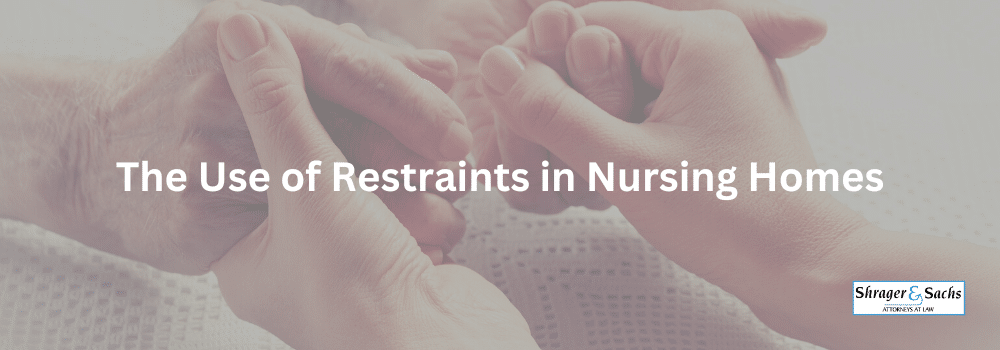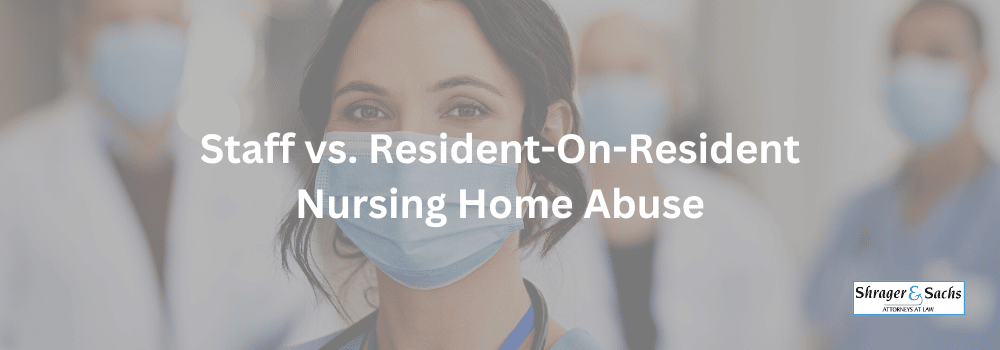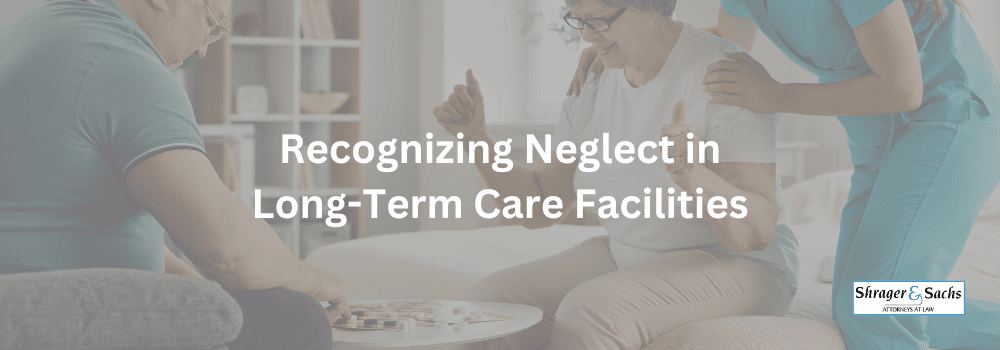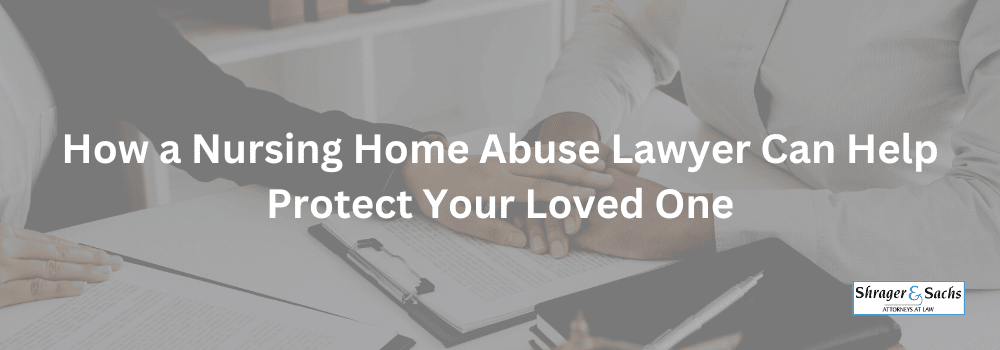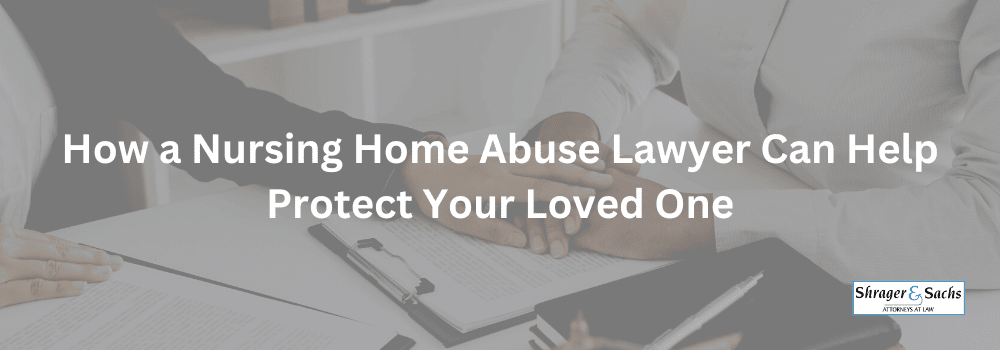There are well over one million nursing home residents in the United States and nearly 10 million elderly individuals over 65 who need assistance completing everyday tasks. Those numbers are expected to continue climbing, which is why long-term care facilities must provide elderly residents with the care they need and deserve.
Philadelphia nursing home residents require access to proper medical care, necessities like food, clothing, and shelter, and opportunities for social interaction. Many families want to trust assisted living facilities to provide their loved ones with high-quality care, but they can’t.
Nursing Home Residents’ Rights in Pennsylvania
The state and federal government regulate nursing homes to ensure each nursing home resident receives adequate care and respect. Government agencies also set the guidelines for how facilities should care for their nursing home residents.
While the Centers for Medicare & Medicaid Services establish federal laws, the Pennsylvania Department of Health implements state guidelines. The Pennsylvania Department of Human Services runs its Adult Protective Services hotline, which follows up on reports of suspected elder abuse and neglect.
Family members and their elderly loved ones residing in nursing homes should know the rights these laws afford them. These rights include:
- Freedom from any form of elder abuse. Residents shouldn’t have to be subjected to physical harm as well as verbal, emotional, sexual, and financial abuse.
- Protected personal information. A resident’s personal information or medical history is private unless they consent to its release.
- Safe and secure living conditions. Residents should be provided with sanitary and comfortable living quarters that offer privacy. Living conditions should provide vulnerable residents with a high quality of life. Physical health, mental health, proper nutrition, and hydration should not be negatively affected.
- Respectful treatment. Nursing home residents have a right to practice their religion and customs without fear of mistreatment.
- Access to health care and living arrangement information. Seniors should be told about their conditions, be allowed to choose a doctor and make decisions regarding medical treatment, and be fully informed about their care.
Assisted living facilities owe a duty of care to their nursing home residents, which means staff must:
- Create an abuse-free environment protected by policies and procedures. All staff members should be properly trained on facility policies to ensure they’re providing elderly nursing home residents with optimal care.
- Report and investigate nursing home resident abuse allegations. Philadelphia nursing home employees must not hide or harbor evidence if there are physical signs of elder abuse, but instead, report them. Nursing home abuse cases need to be properly investigated by authorities.
- Provide individualized care that accommodates residents’ specific needs. Every resident has different needs. Nursing homes should make reasonable accommodations to meet them.
- Allow residents to maintain a high quality of life. Staff must provide residents with proper care necessary to maintain the best quality of life possible.
The Reality of Nursing Home Abuse
People taking advantage of the elderly is a persistent problem. However, analysts suggest many seniors who are ill-treated may be too scared or unable to report their plight. The National Council on Aging suggests that as many as 5 million older individuals may be abused annually.
Common Causes of Nursing Home Neglect and Abuse
Most family members invest significant time and energy researching nursing homes before placing their loved ones in them.
Even the safest assisted living facility could make a mistake and harm your family member. Professional caregivers are capable of making mistakes and it’s important to hold them accountable, so the nursing home abuse isn’t repeated.
Staffing Fatigue and Morale Issues
Nursing home industry and medical malpractice data shows that major issues with skilled nursing facilities revolve around their high turnover rate and understaffing. Philadelphia nursing homes may schedule fewer caregivers than necessary to save money.
Additionally, overworked, overwhelmed, or underpaid nursing home employees sometimes abuse or neglect residents. This can happen if they have too much work to do, they’re fatigued, or simply out of resentment.
If emergencies arise and nursing home staffers need to attend to them first, your loved one may not receive the care they need.
Resident Neglect
Nursing home residents often need help with everyday tasks like getting dressed, using the restroom, and walking. It’s the facility’s job to help them. Residents who aren’t getting help or are unsupervised may lie in bed all day or try doing tasks independently, leading to falls.
Elderly individuals’ falls can result in traumatic brain injuries or broken bones. Injuries may become infected, giving way to long recovery times. Some falls can even be deadly if no one is there to assist residents in a timely fashion.
When a Philadelphia nursing home abuse lawyer from Shrager, Sachs, & Blanco is fighting for your loved one, we’ll get to the bottom of what caused their injuries. Uncovering this information is critical to hold the nursing home accountable for the injuries and suffering your loved one experienced.
We represent your loved one’s best interests, so they get the justice they deserve after suffering nursing home negligence—even if that means we need to file a wrongful death lawsuit after their premature passing.
Types of Nursing Home Abuse and Their Symptoms
Nursing home residents are often targeted for abuse because perpetrators believe these elderly individuals won’t have the mental or physical capacity to fight back or verbalize what happens.
Elder abuse like the following can take on many forms and leave behind sudden, unexpected signs.
Physical Abuse
Staff who shove, hit, or grip too tightly can leave a nursing home resident with a serious injury such as a laceration, welt, or bruise. Physical abuse may result in life-altering injuries, like broken bones or head trauma, or may even claim their life.
While a minor physical injury may happen occasionally, you may rightfully suspect nursing home abuse if incidents become more consistent.
Emotional Abuse
Shouting, insulting, putting down, or belittling seniors is a form of emotional abuse. Nursing room staffers often engage in these tactics to lower residents’ self-esteem and to scare residents into complying with their orders. Victims of emotional abuse may become withdrawn, forgo their usual activities, or experience dramatic shifts in their eating or sleeping habits.
Psychological Abuse
While similar to emotional abuse, this mistreatment involves a caregiver not acknowledging a resident when they speak or do something. Psychological abuse often makes residents feel isolated, experience mood changes, or become easily agitated. If the psychological abuse involves fear, your loved one may appear scared or be unwilling to speak with you about their day-to-day life.
Neglect
Nursing homes may not be able to provide a loved one with the care they need, like ensuring they’re regularly hydrating or exercising, leaving your loved one to develop health problems like dehydration or malnutrition. Neglected individuals also often fall and sustain serious injuries as described above. Also, an unclean facility or poor oversight over patient hygiene may increase serious illness rates.
Financial Abuse
Some people take advantage of the elderly and forge their signatures, use their debit or credit card without permission, or take money from their wallets. If you notice odd transactions on your loved one’s bank statements, unexpected changes made to official documents like wills, or missing money or personal belongings, then this may indicate they’ve been financially exploited.
Sexual Abuse
Any non-consensual sexual contact is considered to be abuse. A sexual assault can affect a person both physically and emotionally. Signs your loved one has been subjected to sexual abuse include:
- They have difficulty walking.
- They are wearing torn or stained clothing.
- There’s bruising or bleeding around their genitals.
- They show signs of post-traumatic stress disorder.
The Use of Restraints in Nursing Homes
Another way in which nursing homes engage in elder abuse is by using restraints on them. Doing so can leave your relative vulnerable to physical harm, mental trauma, and sexual abuse.
Physical Restraints
When you think of restraints, you may think about physical ones that keep your loved one in their bed or chair. These can be dangerous for your loved one if they’re improperly applied.
Restraints that are too loose could cause your loved one to slip out of them and fall. They could also become entangled within the restraints.
Any restraints that are too tight could:
- Cause lacerations.
- Cut off your loved one’s circulation.
- Restrict your loved one’s breathing.
- Cause strangulation.
Chemical Restraints
Philadelphia nursing homes also sometimes use chemical restraints or drugs, like sedatives. They do so to make your loved one more subdued or sluggish so that they’re easier to control or take advantage of, such as subjecting them to sexual abuse. The administration of too much of a sedative can:
- Put your loved one at risk of overdosing.
- Harm their brain and cause seizures.
- Put your loved one in a coma.
- Put their life at risk.
A nursing home’s use of restraints violates your loved one’s rights. The only exception to the rule is if a doctor:
- Approves their use.
- Informs the resident of what’s happening.
- Reports the use of restraints and purpose to the family.
- Discontinues their use when they’re no longer necessary.
The use of restraints may be necessary to protect your loved one’s health and safety, but aren’t appropriate for everyday use.
Signs of Restraint Use
Physical restraints often leave behind red marks, bruises, or cuts on individuals’ wrists or ankles.
Signs of chemical restraint use can be harder to notice. Your loved one may seem more out of it or slow to respond. Noticing these signs may be more challenging if your loved one suffers from a memory disorder like dementia or is taking prescription medication that already makes them appear more subdued.
While it can be painful to think that a nursing home is illegally using restraints on an elderly person, you should remain vigilant for signs of mistreatment in case your loved one can’t tell you what’s happening.
Staff vs. Resident-On-Resident Nursing Home Abuse
If your loved one was abused or neglected, you may be wondering who they interact with regularly so you can identify who hurt them.
Occupations in a Nursing Home
There are many job roles in a nursing home and many of the individuals who hold those positions may interact with your loved one daily.
According to the U.S. Bureau Labor of Statistics Occupational Outlook Quarterly, nursing homes employ:
- Nursing Aides
- Orderlies
- Attendants
- Licensed Practical and Vocational Nurses
- Registered Nurses
- Home Health Aides
- Housekeeping Cleaners
- Food Preparation and Service Workers
- Recreation Workers
- Laundry Workers
Your loved one may also interact with the following professionals in an elder community:
- Physical Therapists
- Dieticians
- Certified Nursing Assistants
- Administrative Workers
A nursing home relies on these individuals to provide your loved one with proper medical care, a safe, clean environment, and nutritious meals. Depending on the symptoms your loved one is experiencing, the source of their abuse or neglect may stem from their interactions with these individuals.
For example, a lack of hygiene could indicate that your loved one’s caregivers aren’t doing their job. If your loved one has physical injuries, then this may indicate that their caregivers are handling them too roughly.
A Philadelphia nursing home abuse attorney will investigate who your loved one was in contact with regularly to find the negligent party. We’ll look at medical records and other evidence to determine the extent of your loved one’s physical injuries and the treatment necessary to help them improve.
Resident-on-Resident Abuse
While you may assume that a regular caregiver is the only one perpetrating nursing home abuse, that’s not always the case. While staff can be negligent or abusive, there’s also the chance of other residents being the same way.
Resident-on-resident abuse is an issue in Philadelphia nursing homes because it’s difficult to recognize and prove. This is because the issue is not well documented, so it’s understudied. Residents can bully, terrorize, and hurt each other. Issues can arise between roommates, and residents can make threats or destroy someone else’s belongings.
Abusive residents may bully other residents intentionally, while others may not be in control of their actions or inhibitions. Those who have memory issues, mood disorders, or have suffered major medical events like strokes may be angry or upset and resort to shouting insults or using profanity without realizing how it impacts others.
No matter how or why the nursing home abuse happens, no one deserves this kind of treatment. When long-term care facilities fail to protect their residents, that’s where a Philadelphia nursing home abuse attorney from Shrager, Sachs, & Blanco comes in. We are understanding and compassionate people who won’t stop until your loved one gets justice.
Recognizing Neglect in Long-Term Care Facilities
Apart from recognizing symptoms of nursing home neglect, what are other indicators that your loved one isn’t in a healthy environment? You may notice a few major red flags when visiting your loved one, including:
Lack of Personal Hygiene
Your loved one should have fresh clothes and bed sheets, and receive daily assistance with personal hygiene. If you notice your loved one has dirty clothes, bad breath, or smells, this may indicate that the nursing home isn’t meeting your loved one’s needs.
Medication Errors
Your loved one may take medication regularly. They may experience an adverse reaction, such as an overdose or health decline if they’re given the wrong medication, the incorrect dosage of the correct one, or nothing at all.
Bed Sores
If your loved one has trouble walking, they may be in their bed, a chair, or a wheelchair during the day. Staff should regularly reposition your loved one and use support from cushions. Their failure to do so could lead to an abnormal concentration of friction in that area of the body, causing pressure sores to emerge. Bed sores, as they’re also often referred to, can easily get infected, causing more significant health issues.
Noticeable Change in Behavior
If your loved one seems more withdrawn, fearful, or aren’t acting like themselves, this could indicate nursing home abuse or neglect.
Weight Loss
If your loved one is experiencing unexplained weight loss, then this may indicate that they’re not receiving the meals they need. Lack of nutrition can weaken your loved one’s immune system, making them more susceptible to sickness and also make it hard for them to maintain muscle and strength.
Unhygienic Environment
The Philadelphia nursing home should be clean. While occasional spills or accidents happen, these should be addressed quickly. A visibly unclean or foul-smelling nursing home is a dangerous environment in which serious illnesses can spread.
Visitors Need Supervision
You should be able to visit your loved one without staff members supervising the entire interaction. You should view any situation in which this isn’t allowed as suspicious. It may indicate that your loved one is being subjected to mental abuse or financial exploitation that their caregivers don’t want you to learn about.
You Cannot See Your Loved One
A situation in which a Philadelphia nursing home prevents you from seeing your loved one without explanation may indicate that they have noticeable injuries from abuse that the facility or caregiver doesn’t want you to see.
Speaking To Other Residents or Families
Take time to speak with other residents and their families about the care they’re receiving when visiting your own loved one. Doing so may provide you with additional insight into the quality of care the nursing home offers.
Complaints
Your loved one may speak to you about their lack of care or abuse in their home. You should take their complaints seriously and address them immediately. However, you shouldn’t assume that their lack of complaints means that they’re not facing abuse or neglect. They may be afraid to speak up about it. That’s why it’s important to watch for other signs of abuse or neglect.
Visiting your loved one at uncommon times allows you to see what the home is like outside of peak hours on a daily basis. You may catch signs of abuse more easily when crowds of visitors aren’t there.
How Nursing Homes Can Provide Better Elder Care
An assisted living facility must possess certain characteristics to provide its residents with quality elder care. Recognizing these elements in a facility you choose for your family member is the best way to ensure your loved one’s safety. Some qualities to look for include:
- All residents should be treated with the utmost respect—no matter their condition.
- Staff members should be friendly, supportive, and caring while respecting residents’ privacy by knocking on doors before entering and providing clear communication during procedures.
- The facility should be clean and orderly, and residents should be well-dressed and groomed.
- There should be various activities for the residents to participate in. Nursing homes should provide social, physical, educational, and creative activities that allow for social interaction and provide mental stimulation.
- The nursing home facility should look warm, comfortable, and inviting. Residents who can bring their own furnishings and pictures will be happier.
- Food should be attractive, well-balanced, and available in a pleasant setting.
Unfortunately, even if a Philadelphia nursing home possesses the qualities discussed above for proper elder care, your loved one could come into contact with an abusive employee, or the quality of the nursing home could decrease. You can take steps to remedy the situation if you believe your loved one isn’t receiving the care they deserve.
How a Nursing Home Abuse Lawyer Can Help Protect Your Loved One
A lawyer can guide you through the legal process and determine what has happened if it’s assumed your loved one was abused. Your first priority, however, will be getting them into a safe environment.
You can contact a Long-Term Care Ombudsman to advocate for those who live in nursing homes and assisted living facilities. Their priority is ensuring senior citizens receive necessary care and are in safe and healthy environments. The Ombudsman Program isn’t funded or run by nursing homes, so there’s no incentive for them to ignore your loved one’s complaints against the institution.
You can also file a nursing home abuse complaint with the Pennsylvania Department of Health. This alerts the state that there is potential nursing home negligence such as physical assault, sexual abuse, financial exploitation, or other types of improper treatment.
Keep track of the reports you make and who you speak with. Your Philadelphia nursing home abuse lawyer will use that information to show how seriously you’re taking the matter.
Depending on what has happened, your loved one’s abuse may have occurred with intent from the abuser. This may be considered a crime. While contacting services to help your loved one and getting in touch with a lawyer, you may also want to call the police.
After you have ensured your loved one is safe, an experienced lawyer can help you start your claim. It can be challenging to go up against a long-term care facility alone. Our Philadelphia lawyers will ensure your nursing home abuse claim is thoroughly investigated, so there’s a complete understanding of what your loved one has been through.
To start the investigation, your Philadelphia nursing home abuse lawyer will speak with your loved one, their facility, and any possible witnesses. Medical records and video records can support claims and prove Philadelphia nursing home negligence occurred.
Your attorney will compile medical bills to substantiate damages. Once a strong case has been built in your family’s favor, your personal injury attorney can prove how the facility wronged your loved one and what compensation is owed for the sustained damages. Calculating losses is complicated, especially when there are noneconomic damages, but your attorney will have access to the experts who can make those calculations and estimates.
When your loved one has suffered because of nursing home abuse or neglect, you must seek justice. Scheduling a free consultation is the first step to setting the legal process in motion.
A skilled Philadelphia nursing home abuse lawyer from our firm will do everything possible under Pennsylvania law to get your loved one the compensation they deserve. Your actions may also spark change within their long term care facility. Any newly instituted policies and procedures can ensure no one else suffers physical abuse or harm at their nursing home.
We’re ready to help you move forward in your Philadelphia nursing home abuse case. Get in touch with us to schedule a no-obligation case evaluation today.

